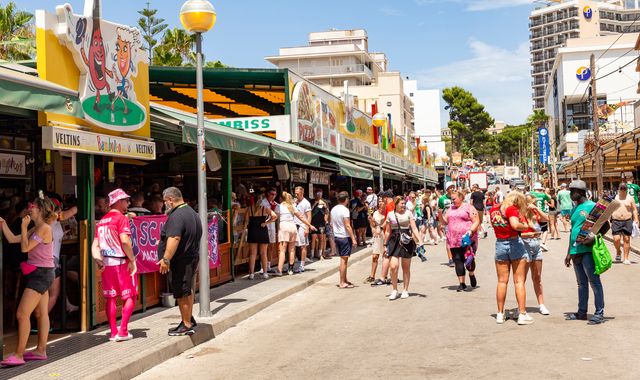Under a new law passed by the government of Spain’s Balearic Islands, the sale of alcohol will be completely banned in the “over-tourist” areas of Mallorca and Ibiza between 9.30pm and 8am.
In a bid to crack down on holiday drinking in tourist destinations, laws have completely banned the sale of alcohol late at night in Llucmayor, Palma and Calvia (Magaluf) on Mallorca, and San Antonio on Ibiza.
Authorities have also banned party boats from sailing within one nautical mile of these destinations, and vessels are also prohibited from picking up and dropping off passengers in these areas, the Mallorcan daily reported.
But some businesses have criticized the bill, saying tourists will simply go to nearby resorts that are not subject to the restrictions.
The ban follows a tightening of legislation passed by the Balearic government four years ago to tackle excessive alcohol consumption.
The 2020 law bans happy hours, pub crawls, two-for-one drinks, bans alcohol sales in stores between 9:30 p.m. and 8 a.m., and bans party boat advertising in designated areas. was also prohibited.
The new decree comes after the government warned unruly tourists that they could face hefty fines with tougher sanctions for bad behavior.
Up to €16 million (about £13.7 million) will be spent on enforcing the ban on drinking in public places, security, testing and raising awareness among tourists in “over-touristed” areas.
read more:
Pubs may be able to extend opening hours during Euro 2024
The napkin that sealed the transfer of a soccer legend will go on sale
The Canarian Weekly website offers a fine of between €750 and €1,500 (from £645 to £1,290) if drinking on public roads “disturbs coexistence, involves crowds or degrades the tranquility of the environment”. It was reported that a fine could be imposed.
If the breach is deemed to be very serious, fines can range from €1,500 to €3,000 (£1,290 to £2,580).
Parma Mayor Jaime Martínez said one of his main objectives was to “correct disrespectful attitudes.”
The deadline for this ordinance is December 31, 2027, after which the government hopes it will no longer be necessary.

